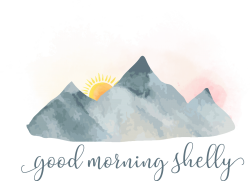Day 11: Perils on the Trail

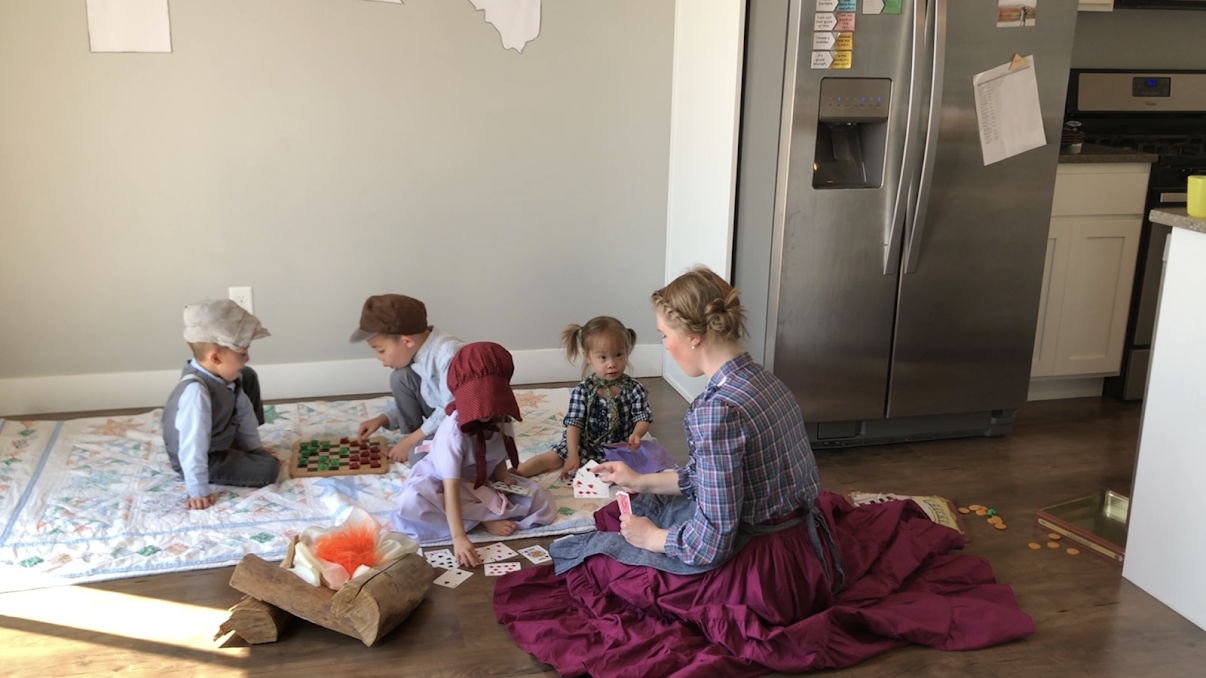
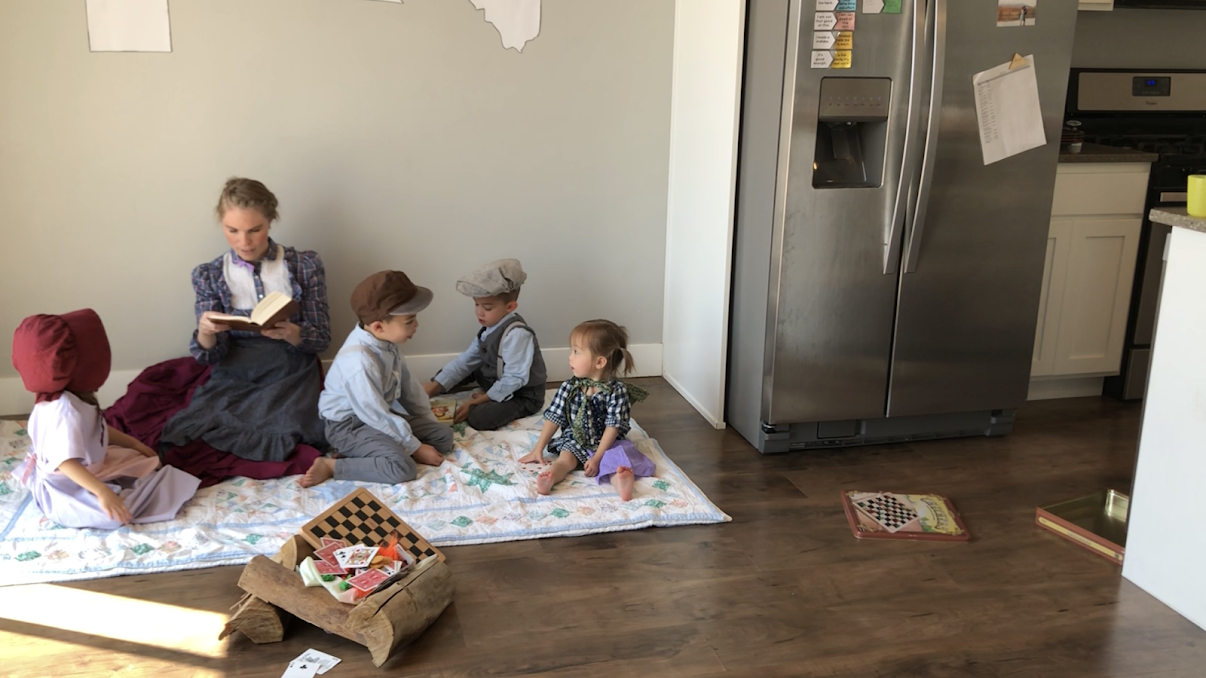
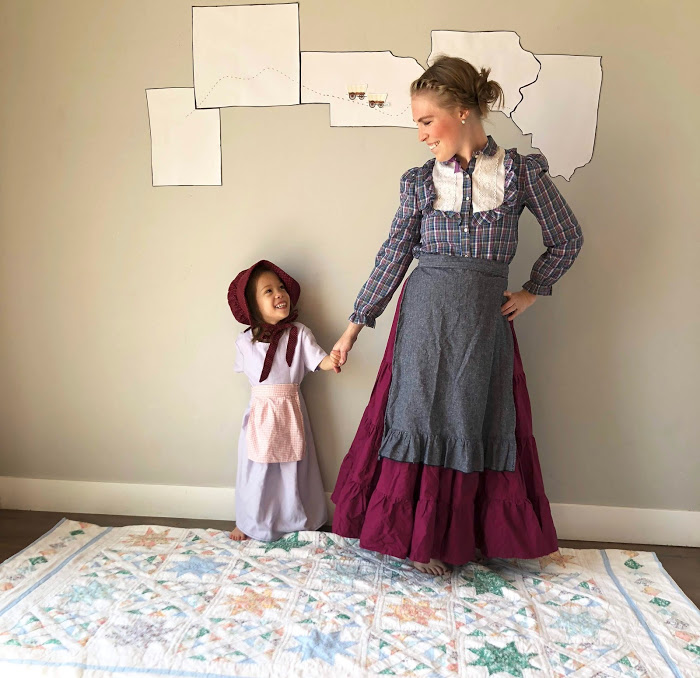
Day 12: Closer to Zion
By mid-June, the Saints had to cross the North Platte River in order to continue west. Crossing the river was a problem, being about 100 feet wide and 15 feet deep, with a fast current. The group first settled on a plan to get poles from the mountains and use them to lash wagons together. That would keep them from tipping over as they floated across the river. That plan didn’t work out well and they decided that it was too dangerous. They tried other ideas that didn’t work out well either.
Finally, according to Thomas Bullock, Brigham “sent a four-horse team to get timber to make a good raft.” When they returned, Brigham combined the new timber with wood already at hand and “went to work with all his strength,” aided by others. They made a “first rate” raft that “worked well.” Over several back breaking days, they used the raft to get the wagons onto the other side of the river.
Even before Brigham and his company crossed the river, an emigrant company hired some of the Saints to help get their belongings across the water. Payment was made in flour at the rate of $2.50 for one hundred pounds. The flour they earned was divided among the Saints. Each person received five and half pounds of our, plus some bacon and meal.
Wilford Wodruff wrote, “It looked as much of a miracle to me to see our flour and meal bags replenished in the midst of the Black Hills as it did to have the children of Israel fed with manna in the wilderness.” (Wagons West, pg. 118)
We talked about how even though their first (and others) plan failed, they kept trying and Heavenly Father kept inspiring them until they created something that was successful. And not only was it successful in helping them to get their own wagons across the river, but they were also able to help others. If their first plan had worked, they wouldn’t have had the raft to help others. And helping those other people was how they received much needed food.
Sometimes it is frustrating and discouraging when our plans don’t work as we want them to. But if we just keep moving forward, we come to see that things work out for our better good. They always do.
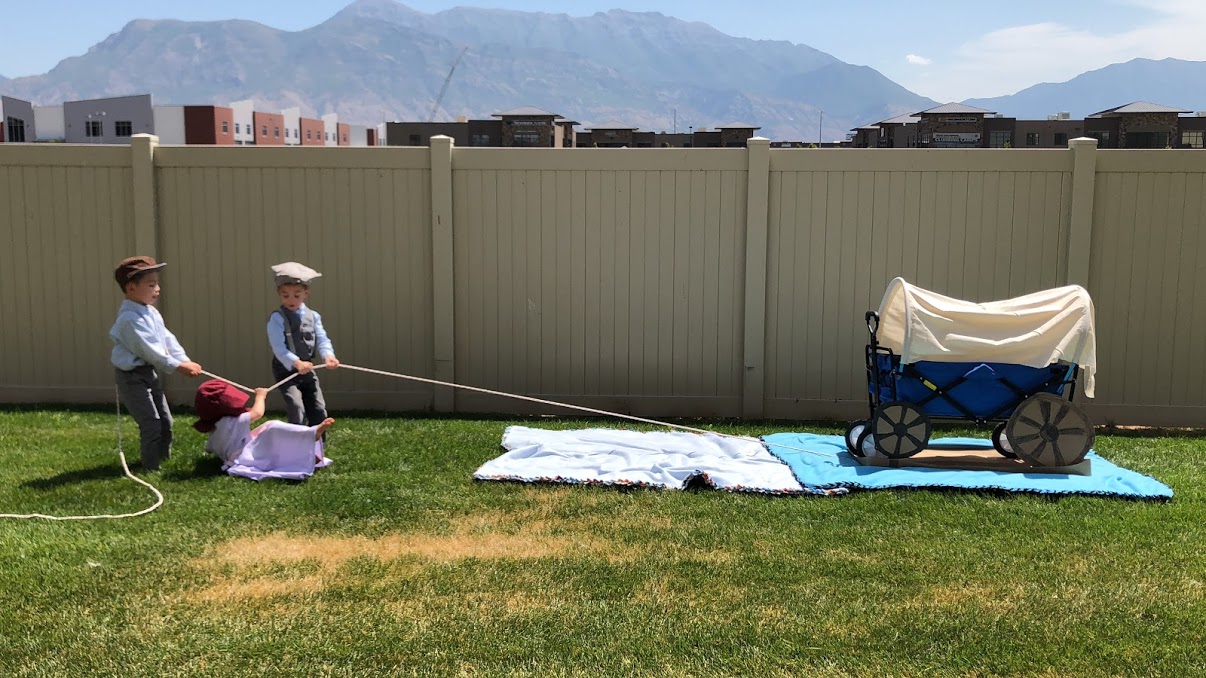

For our activity, we made a raft out of a cardboard box (a girl in our neighborhood happened to have a giant box that was the perfect size!). Then we set up the “river” in our backyard again, put our covered wagon on the raft (with a rope connected to the raft) and pulled our wagon / raft across the “river”.
Day 13: Mountain Fever
“Now that the wagon train was approaching the mountains, the altitude increased and the temperatures dropped. The Saints added layers of clothing to guard against the chilly air. But after the desolation of the prairie, they enjoyed the changed landscape.
But there were drawbacks with the altitude. Although it was warm in the daytime, the air was freezing at night. The quick change in temperatures was blamed for people getting mountain fever. It was not really the cause, though it may have made some people worse. At any rate, several pioneers became miserably ill.” (Wagons West, pg. 125)
The Saints then faced what William Clayton called “the most mountainous course we have yet seen.” “To make matters worse, a number of men were so sick they couldn’t drive their wagons without the help of others. A big problem now was the steepness of the mountains they were climbing. “Almost perpendicular,” Thomas Bullock wrote about the trail. He commented that “looking back from the bottom looks like jumping off the roof of a house to a middle story, and then from the middle to the ground.” He thanked God that he didn’t have an accident on that stretch.” (Wagons West, pg. 134)
For our activity, We took some time to rest as we recovered from Mountain Fever (the kids laid on the quilt on the floor and I dabbed their foreheads and cheeks with a wet warm washcloth).
Then we had to move on and push and pull our wagon up the “steep” mountains. The kids pushed/pulled our covered wagon up the hill by our house… it was too easy for them though. I should have put more weight in it. 🙂
Day 14: Pioneer Children
We are a day ahead of schedule so I decided to use today to learn about pioneer children. First, we did some chores. milked the cow, gathered firewood, and hauled water.
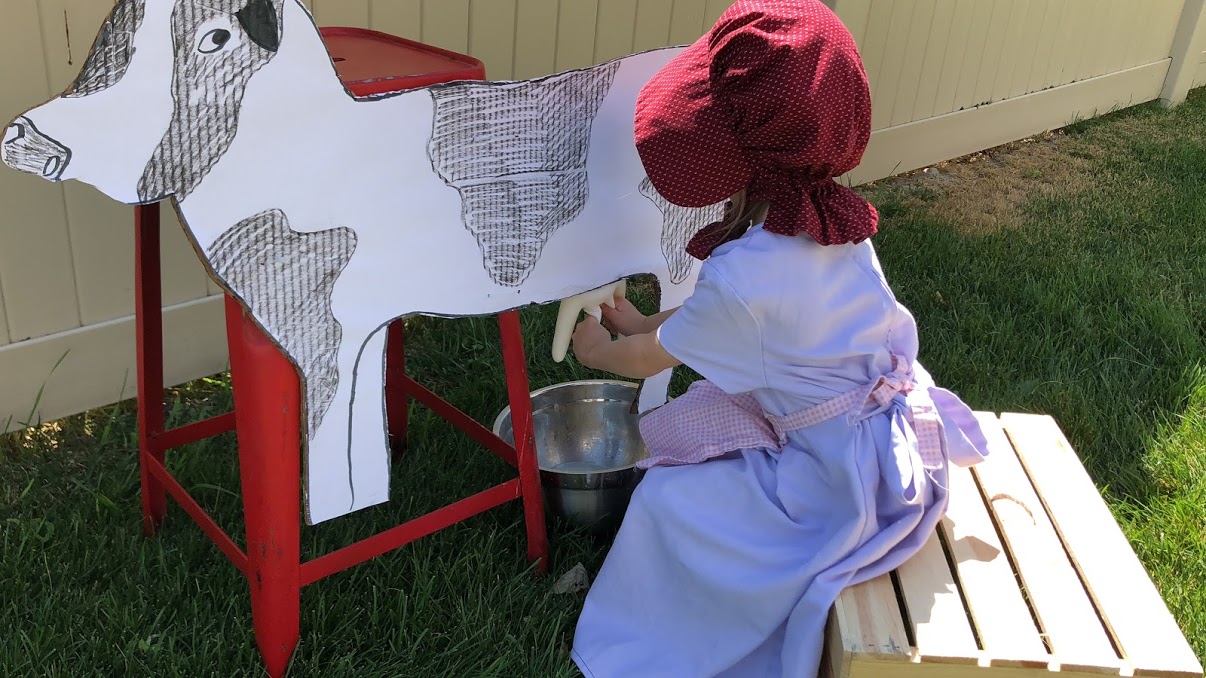
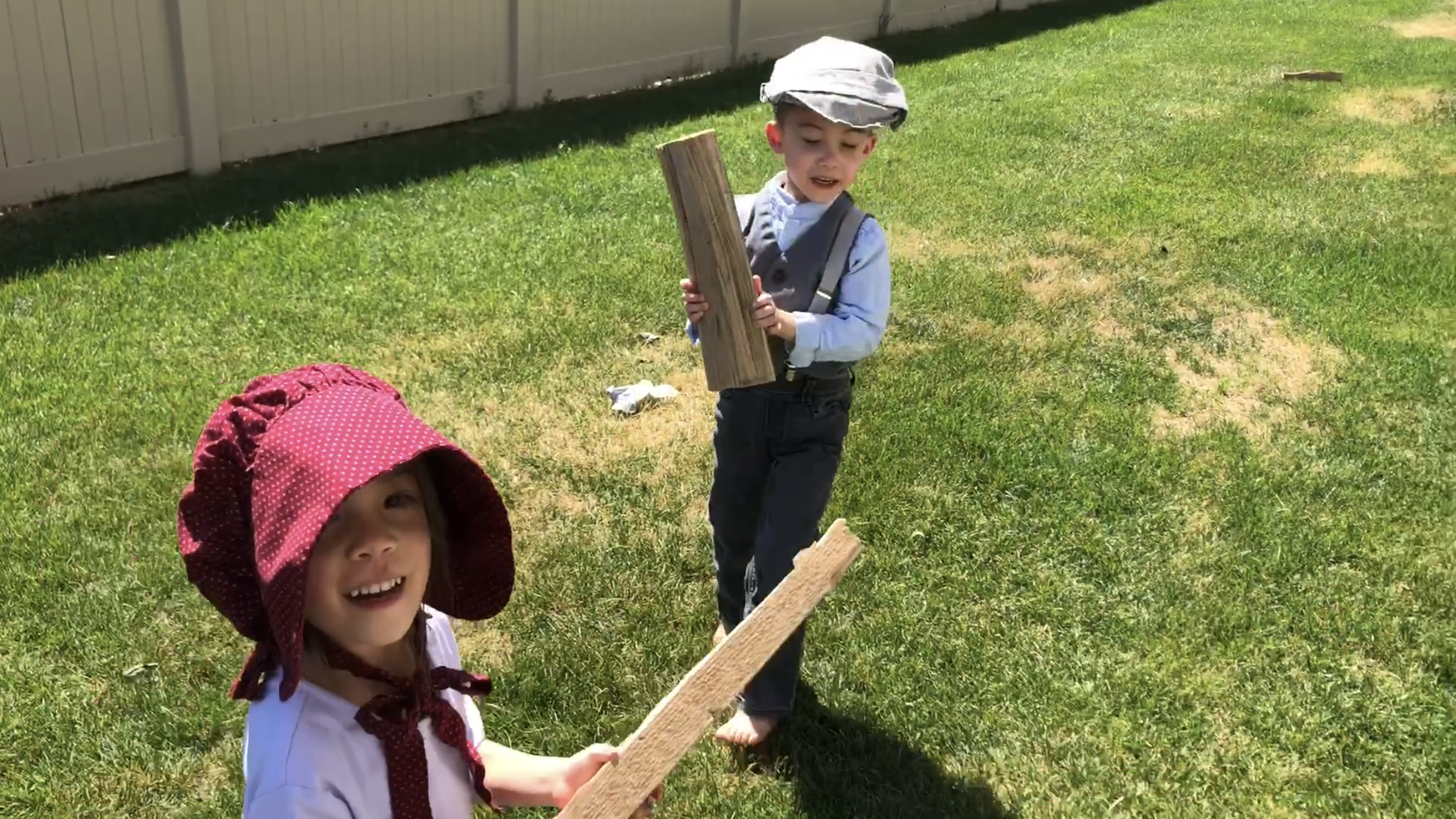
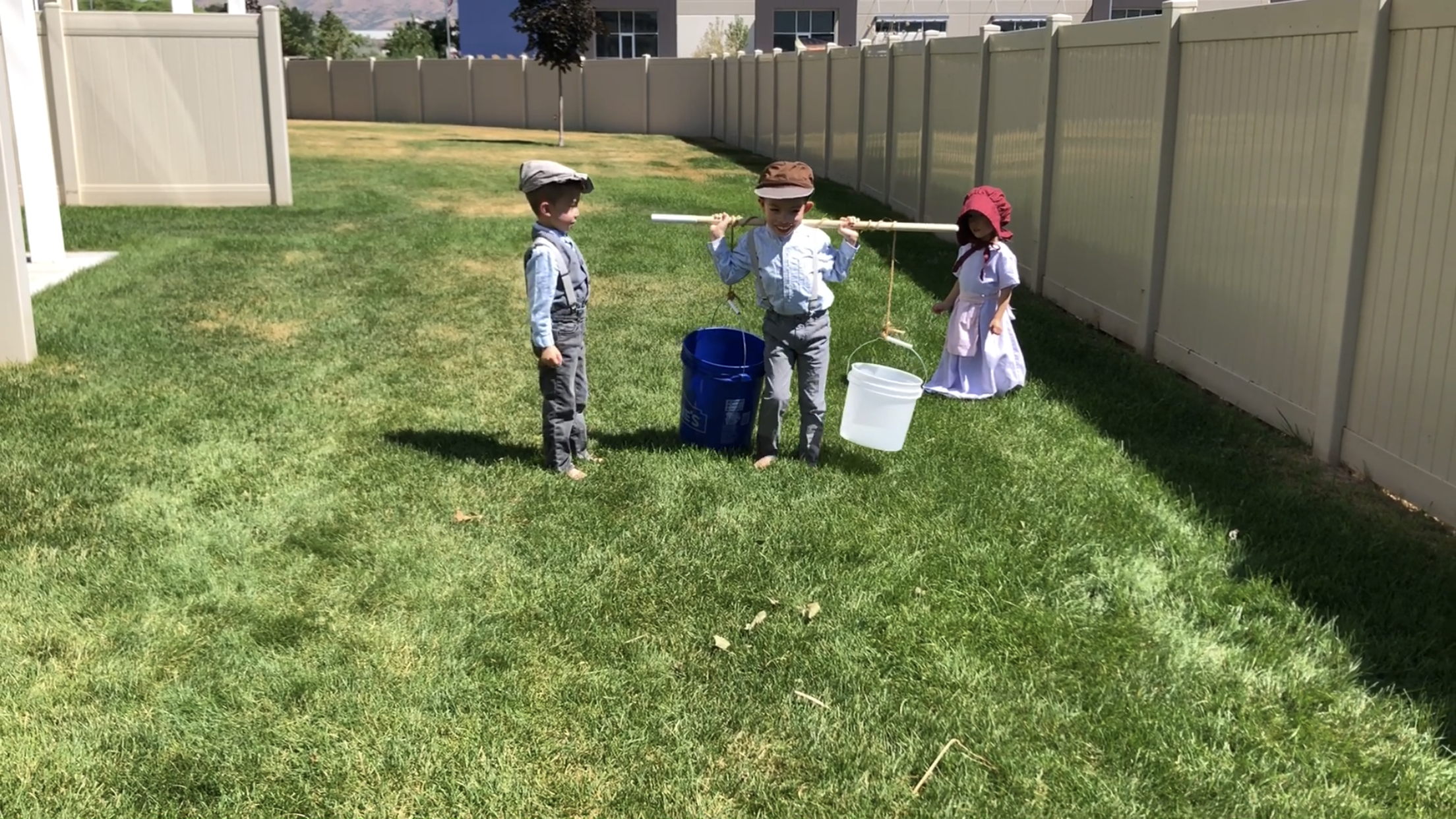
Then we went to school where we learned some of the Deseret Alphabet and did some math problems.
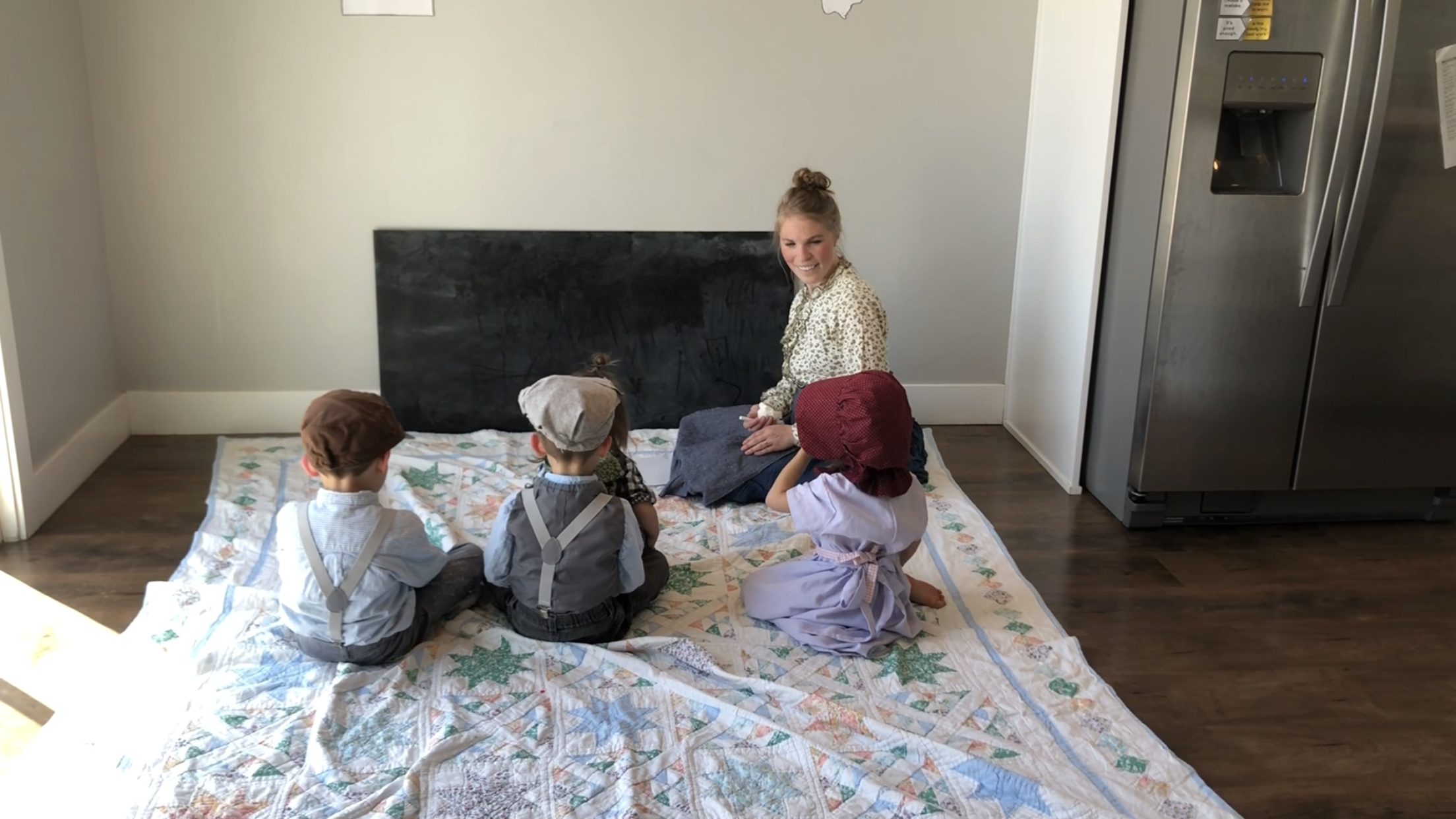
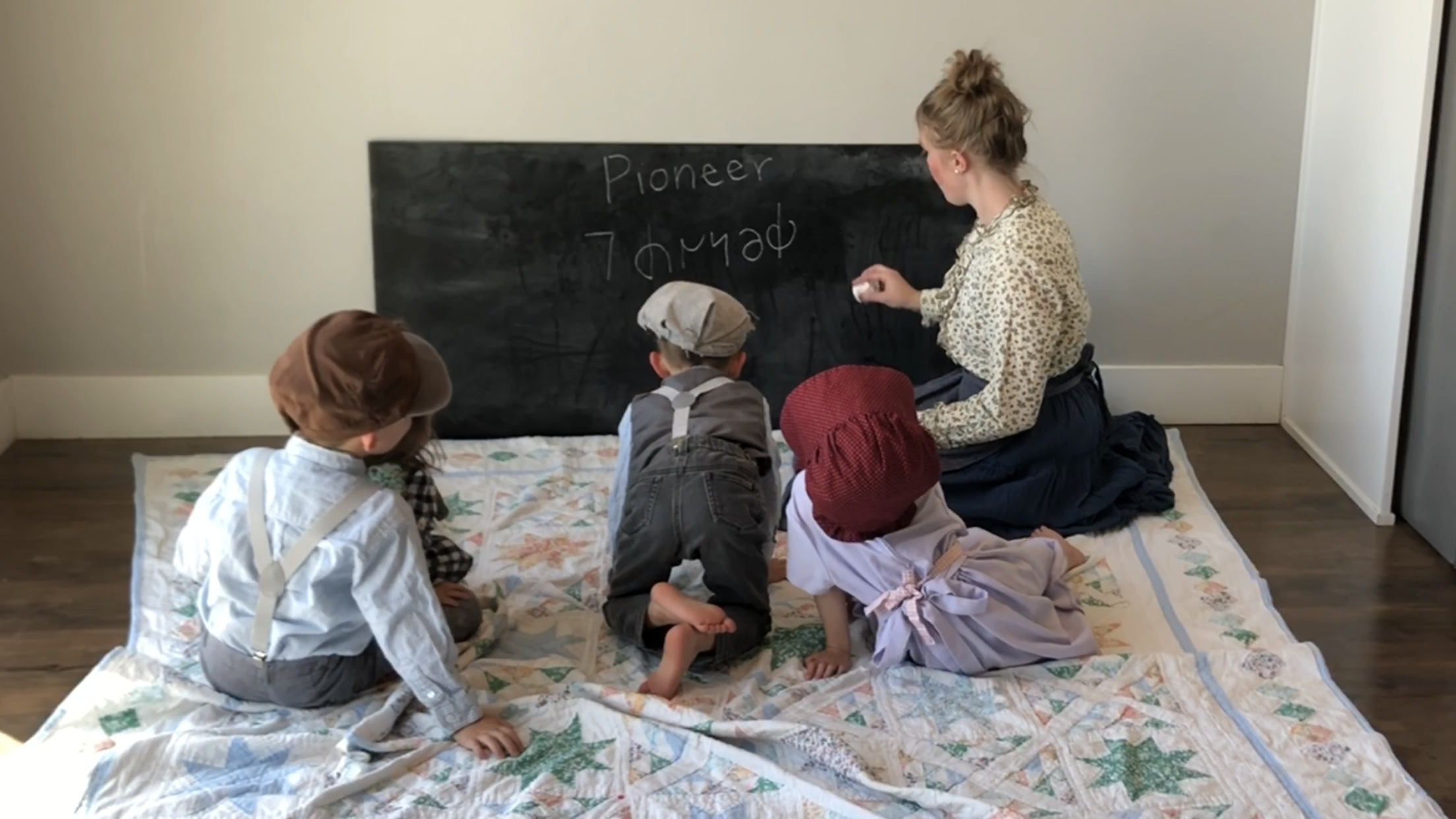
Pioneers came to the Salt Lake Valley from many different countries, speaking lots of different languages. To help people learn to speak and write English, Brigham Young and others created a new alphabet. It had 38 letters, and each letter stood for a different sound in English.
After school it was time to play! 🙂 We dropped clothes pins into jars, played “button button, who’s got the button” and raced with burlap sacks.
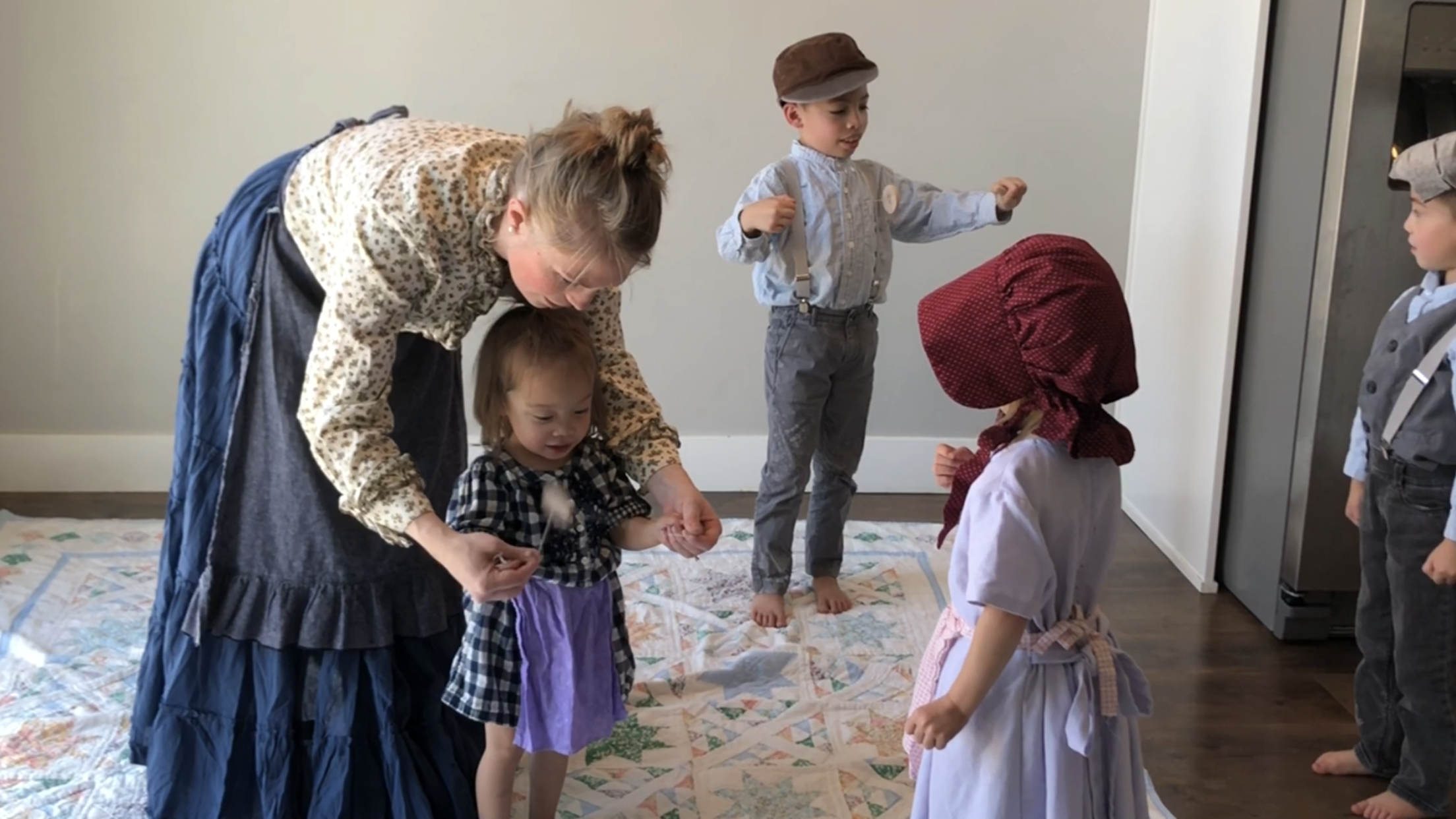
It was quite the eventful day for our little pioneer children.
Day 15: This is the Place
On July 24, 1847, (171 years ago today), Brigham Young and Wilford Woodruff finally emerged from the last canyon. Wilford expressed their feelings when he wrote, “We came in full view of the great valley or basin” of “the Salt Lake and land of promise, held in reserve by the hand of God for a resting place for the Saints.”
Brigham and Wilford admired the length and breadth of the Salt Lake Valley. Wilford commented on the heavy vegetation, the large lake with its islands, and the streams and rivers that flowed from the mountains toward it.
He thought about the “hard journey from Winter Quarters,” a trip of more than a thousand miles. After all that – after all the pain and strain and sickness – they were finally at their destination.
“Our hearts were surely made glad,” Wilford wrote. Wilford recorded how they looked out on the beautiful valley, with its surrounding mountains, and pictured the day that “the House of God” would rise and “the standard be unfurled for the nations to gather there.” (Wagons West, pg 144)
We did it! We made it to the Salt Lake Valley! 🙂

We are excited to celebrate Pioneer Day today. Our appreciation and love of the pioneers has grown so much over the past few weeks.
We didn’t do a whole lot for the activity for today. We sang “Come Come Ye Saints” (which we have been singing at the beginning of each day of the unit as well), and the kids stood on the deck, looking over the “valley” (the empty field behind our house) and said “We made it to the Salt Lake Valley!”)

Day 16: To Be a Pioneer
This was the last day of our pioneer unit. Even though we have learned a lot and had a lot of fun, I feel like we have barely scratched the surface. This may be the end of our official unit, but it’s only the beginning of our love of the pioneers and our ancestors and learning about church history. There is so much more to learn and discover.
I wanted to finish off our unit with a combined theme of “Shall we not go on in so great a cause?” and the characteristics of courage, faith, and hard work.
Now that we have talked about the history of the pioneers crossing the plains from Nauvoo to Salt Lake, we talked about the why. Why did the pioneers do what they did? Why did they endure persecutions (and not give up and leave the church)? Why did they give up everything, including all the comforts of life – multiple times – to walk over 1000 miles to come to a new and foreign place?
Because they truly believed that Joseph Smith was a prophet and that the Book of Mormon was true.
Because they had found answers to their deep questions and longings, in the gospel.
Because they had received their own witnesses of the truthfulness of the gospel – they asked God and He answered them. And then they trusted those answers and held onto them, even when things got really hard.
Because they wanted to give that knowledge and those blessings to their posterity.
We live in a different day and age now. We don’t have to push a handcart or leave our families. We don’t have to walk a thousand miles or more.
We still want to be like the pioneers though. And to be like them we need to have courage, faith, and work hard.
We talked about how important it is for us to have courage. To live with heart.
We talked about having faith and strengthening our testimonies, especially of Joseph Smith and the Book of Mormon.
It is becoming increasingly more common for people to leave the church because of doubts surrounding church history. If you want to remain an active member of the church, it’s important to keep your testimony strong – especially in regards to Joseph Smith and the Book of Mormon.
We talked about hard work and how we have to be willing to put in the work to have courage and faith. It requires physical, spiritual, mental, and emotional work. Don’t give up when things get hard. Put in the work that is required to keep moving forward.
We talked about receiving witnesses of the truthfulness of the gospel.
As part of this discussion about developing and strengthening our testimonies of Joseph Smith being a prophet, we followed a suggestion from Elder Neil L. Andersen (from his talk, Joseph Smith, in the October 2014 General Conference).
He said “Read the testimony of the Prophet Joseph Smith in the Pearl of Great Price or in this pamphlet. This is Joseph’s own testimony of what actually occurred. Read it often. Consider recording the testimony of Joseph Smith in your own voice, listening to it regularly, and sharing it with friends. Listening to the Prophet’s testimony in your own voice will help bring the witness you seek.”
The boys and I took turns reading (while audio recording on my phone) Joseph Smith’s testimony of the first vision. I hope to, someday soon, have the boys record the entire thing, each by themselves.
I told the kids about my own conversion story/ receiving a witness.
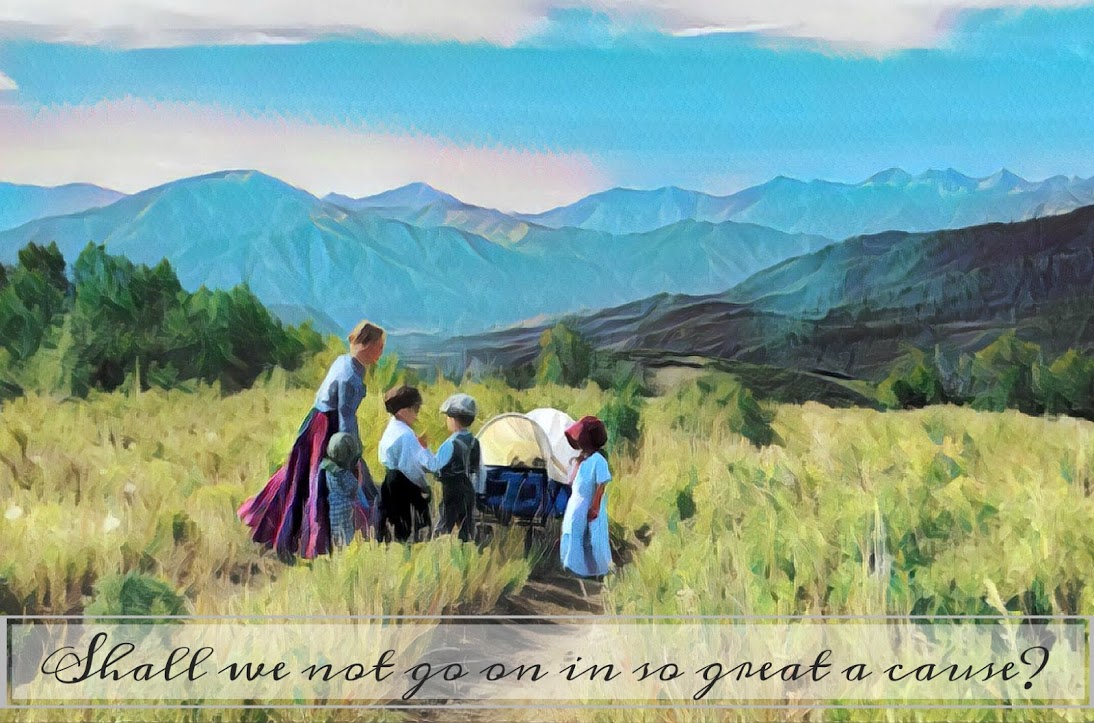
I have been a member of The Church of Jesus Christ of Latter-day Saints my whole life. My parents taught me the gospel and we were always very active. I never doubted that the church was true, but throughout my teenage years (especially from 15-17 years old,) I felt the need to really come to know for myself the truthfulness of the gospel. I wanted to gain my own testimony.
I don’t think I was hoping to have an angel come visit me or to have some miraculous experience, I just wanted my reassuring “yes, this is true”. At times, I did hope for a lightning bolt experience though. I remember several times, going out into nature, reading my scriptures and then kneeling down to say a prayer.
I would plead with Heavenly Father to testify of the truthfulness of the gospel. I usually stayed for a few minutes and then got up – feeling not much of anything. I remember feeling a little bit frustrated, but not that bothered by it at the same time. I have several entries recorded in my journal of these conversion seeking experiences.
When I was 17 1/2, I received my witness while watching the movie – Joseph Smith: The Prophet of the Restoration. I had the following experience that I recorded in my journal… “We went to see the new Joseph Smith movie in Nauvoo yesterday…it was really good!
At the end, it was just quiet for like a minute and there weren’t any credits, and it just sort of hit me…I know that it’s true! I mean, I’ve always known deep in my heart that the gospel’s true…but I’ve never had a little strike of lightening thing like that before. It was kinda cool!
I finished the Book of Mormon on Saturday. It was cool! I’m gonna try to read it again by May.” I recorded more details a few years later… “I remember watching the Joseph Smith movie and at the very end, it says “Shall we not go on in so great a cause?” That (and the silence afterwards) struck me pretty strongly. I knew that the church was true.
I had known all along, but it was nice to have my little conversion moment. I still love the spirit that I feel when I watch this movie. Not only because of the truthfulness of the gospel and for what the movie testifies of, but I also have a special love for it because of the long sought after experience that I had while watching it.”
I saw that movie again, 6 months later, when I was 18. And again, I had a powerful experience while watching it. I recorded “When we went to Independence, we watched the new Joseph Smith movie at the visitor’s center. I had seen it before, but for some reason this time it hit me more.
I felt the spirit and just as I was watching it, I realized “I know the church is true.” I guess I’ve always known, but it has never hit me like that before. After we watched the movie, we ate dinner and then had a testimony meeting! I bore my testimony and felt the spirit. It was really good.”
And again, 2 months later, I received a witness the 3rd time, through this same movie. “Today was fast and testimony meeting. I bore my testimony. I talked about seeing the Joseph Smith movie (I saw it for the 3rd time on Wednesday).
I said “I used to wonder why they placed so much emphasis on the Joseph Smith story. Then I realized that if you know it’s true then you know that everything else is true also. It also teaches us an important lesson that if we want to know about something or know if it’s true then we have to test it. Joseph Smith did that. He lacked wisdom so he asked.”
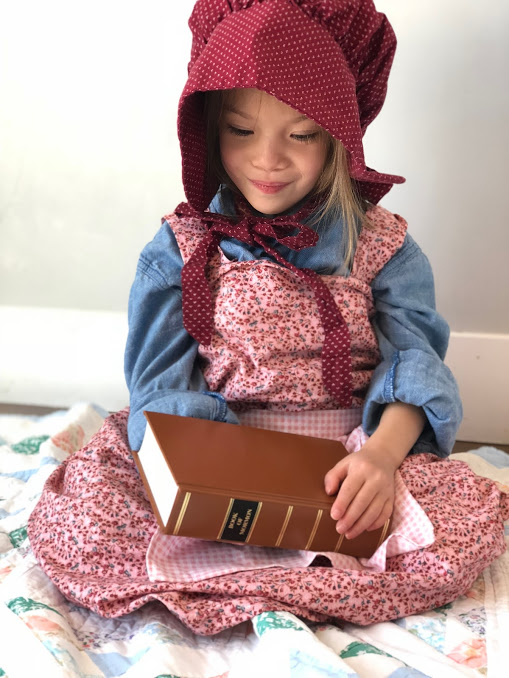
For Family Home Evening on Monday, we watched this same movie about Joseph Smith, in preparation for today’s unit study. Again, I felt the same witness of the truthfulness of the gospel and that Joseph Smith was a prophet.
Towards the end of the movie, as Joseph and Hyrum are martyred, Joseph’s voice is heard in the background, quoting a pieces of scripture (Doctrine and Covenants 128: 19, 22) : “What do we hear in the gospel which we have received? Truth out of the earth. Mercy from heaven. A voice of gladness for the living and the dead. Shall we not go on in so great a cause?”
We shall. We will keep moving forward, living and sharing the gospel. It truly is a voice of gladness for the living and the dead.
We will carry on the legacy that our pioneer ancestors started.
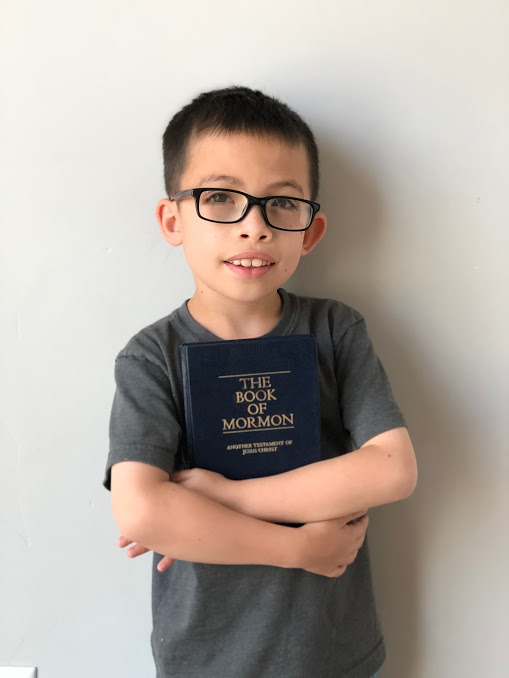
I also showed Landon a copy of the Book of Mormon. This isn’t just any old copy. It is HIS copy. THE copy that he read, cover to cover, nearly every day, starting when he was 6 1/2 and finishing on his 8th birthday (which was 9 months ago).
He wrote something in the margins of every page – something that he learned from that day’s reading.
I told him that this would become one of his most prized possessions because this book contained little gold nuggets and puzzle pieces of his budding testimony.
I showed him the back page where he recorded his short and sweet testimony about praying (on the morning of his 8th birthday, after finishing the Book of Mormon) to know if the Book of Mormon was true.
He said that he had forgotten about that. He didn’t remember writing that down. I told him that this is one of the witnesses that he received and that it’s a good thing he recorded it.
For quick reference, here are the links:

